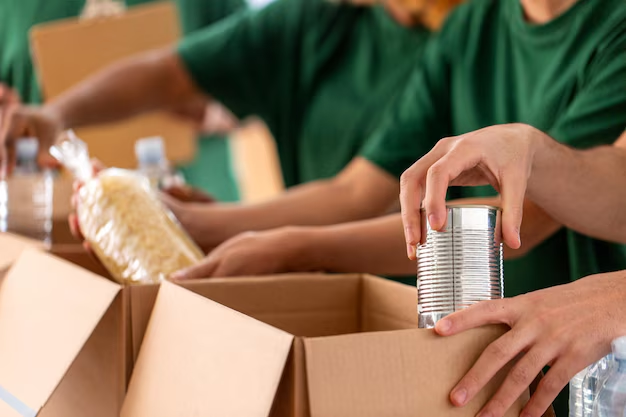Navigating Food Banks: How to Access Essential Resources in Your Community
When financial times get tough, ensuring consistent access to food can become a significant stressor. Food banks offer a crucial source of support, providing necessary supplies to those in need. If you're wondering, "How do I get access to a food bank?" you're not alone, and this guide aims to illuminate the path toward utilizing this valuable resource.
Understanding Food Banks: What Are They?
Food banks are non-profit organizations that collect, store, and distribute food to those in need. They act as a central hub, gathering large quantities of food contributions and distributing these goods to dedicated agencies or directly to individuals. This system is built on community solidarity, offering a practical solution to alleviate food insecurity.
How Food Banks Work
- Collection: Food banks gather supplies from diverse sources, including donations from individuals, grocery stores, farmers, and food manufacturers.
- Storage: They maintain large warehouses designed to store significant volumes of food, ensuring that storage conditions meet safety standards.
- Distribution: Food is then distributed to local agencies like shelters, food pantries, or directly to those in need, providing a critical lifeline in difficult times.
Who Can Use a Food Bank?
Food banks generally welcome anyone facing food insecurity. Requirements can vary, but they typically cater to individuals and families who meet certain income criteria or those experiencing temporary hardship. In many cases, the primary aim is to assist those in immediate need, with eligibility centered around economic constraints.
Steps to Access Your Local Food Bank
Identifying how to access a food bank can seem daunting, but follow these straightforward steps to ease the process:
1. Locate Your Nearest Food Bank
Searching Online: A quick search term like "nearest food bank" alongside your city or zip code will help you find local facilities. Numerous directories and national networks also offer online tools to pinpoint a nearby resource.
Community Centers & Libraries: Check with local community centers or libraries, as they often have information on local food assistance programs.
2. Understand the Eligibility Requirements
Before visiting a food bank, it's essential to understand any specific eligibility requirements. While many operate on an honor system, some may require proof of address, identity, or household size to verify eligibility.
Common Documents You Might Need:
- Identification (Driver’s license, state ID)
- Proof of residency (Utility bill, lease)
- Income documents (Pay stubs, benefits letter)
3. Visit or Contact the Food Bank
Plan Your Visit: Food banks often operate on specific days or hours, so planning ahead is crucial. Some may require an appointment, while others offer open hours.
Contact Ahead: If possible, call ahead to confirm their operating hours and ask any questions about required documentation or the process.
4. Follow Guidelines and Procedures
When visiting, adhere to any guidelines provided by the food bank staff. Due to high demand and safety protocols, some banks may have specific procedures or limits on the amount you can take.
5. Return as Needed
Depending on your situation, you may visit a food bank regularly. Familiarize yourself with their schedule and procedures to make subsequent visits straightforward.
Additional Options and Resources
Aside from food banks, several avenues can boost food security and provide continuous support.
Community Pantries and Soup Kitchens
Many neighborhoods have smaller community pantries that function similarly to food banks. Soup kitchens offer hot meals, helping to assure at least one nutritious meal per day. Beyond food, these venues provide a community atmosphere and support network.
Government Assistance Programs
Government assistance programs, such as the Supplemental Nutrition Assistance Program (SNAP) or Women, Infants, and Children (WIC), can significantly augment resources from food banks.
- SNAP: Helps cover grocery costs, ensuring ongoing access to nutritious food.
- WIC: Supports pregnant women, new mothers, and young children with meals and educational resources.
Online Food Aid Directories
Websites dedicated to food aid often provide comprehensive directories, detailing options ranging from food banks to government resources and other community services.
Local Religious and Ethnic Organizations
These groups frequently organize community support and meals, providing both food assistance and cultural community engagement.
Overcoming Barriers to Access
Challenges such as transportation, language barriers, or disability can make accessing a food bank challenging. Here’s how you can overcome these obstacles:
- Transportation: Some organizations offer mobile food banks or deliver services, bringing food closer to you.
- Language Assistance: Utilize bilingual or multilingual staff, common in diverse communities. Some resources also offer document translations.
- Disability Resources: Many food banks have accommodations in place for those with disabilities, ensuring access for all.
Key Takeaways for Smooth Food Bank Visits 🌟
- **🗺️ Research Nearby Options: Use tools like online directories or community resources to find accessible food banks.
- **📅 Plan Visits Ahead: Confirm operating hours and understand the requirements, saving time and ensuring preparedness.
- **🆔 Prepare Documentation: Know the typical documents needed to satisfy eligibility requirements.
- **🔄 Return as Needed: Food banks often allow recurring visits, catering to ongoing needs.
- **🤝 Explore Additional Resources: Mix food bank support with programs like SNAP, WIC, and community kitchens for comprehensive aid.
Navigating the process of accessing a food bank requires understanding and preparation, but with the correct information and resources, you'll be well-equipped to utilize this invaluable community service. Food banks provide more than just food; they represent hope and community support during challenging times, and knowing how to use them effectively can make a significant difference.

Related Topics
- Are Food Banks Free
- Are There Any Food Banks Open Today
- Can Anyone Go To a Food Bank
- Can Anyone Go To The Food Bank
- Can You Bring Food Into Citizens Bank Park
- Can You Take Food Into Citizens Bank Park
- Do Food Banks Take Expired Food
- How Do Food Banks Work
- How Do I Start a Food Bank
- How Do You Get Food From a Food Bank
